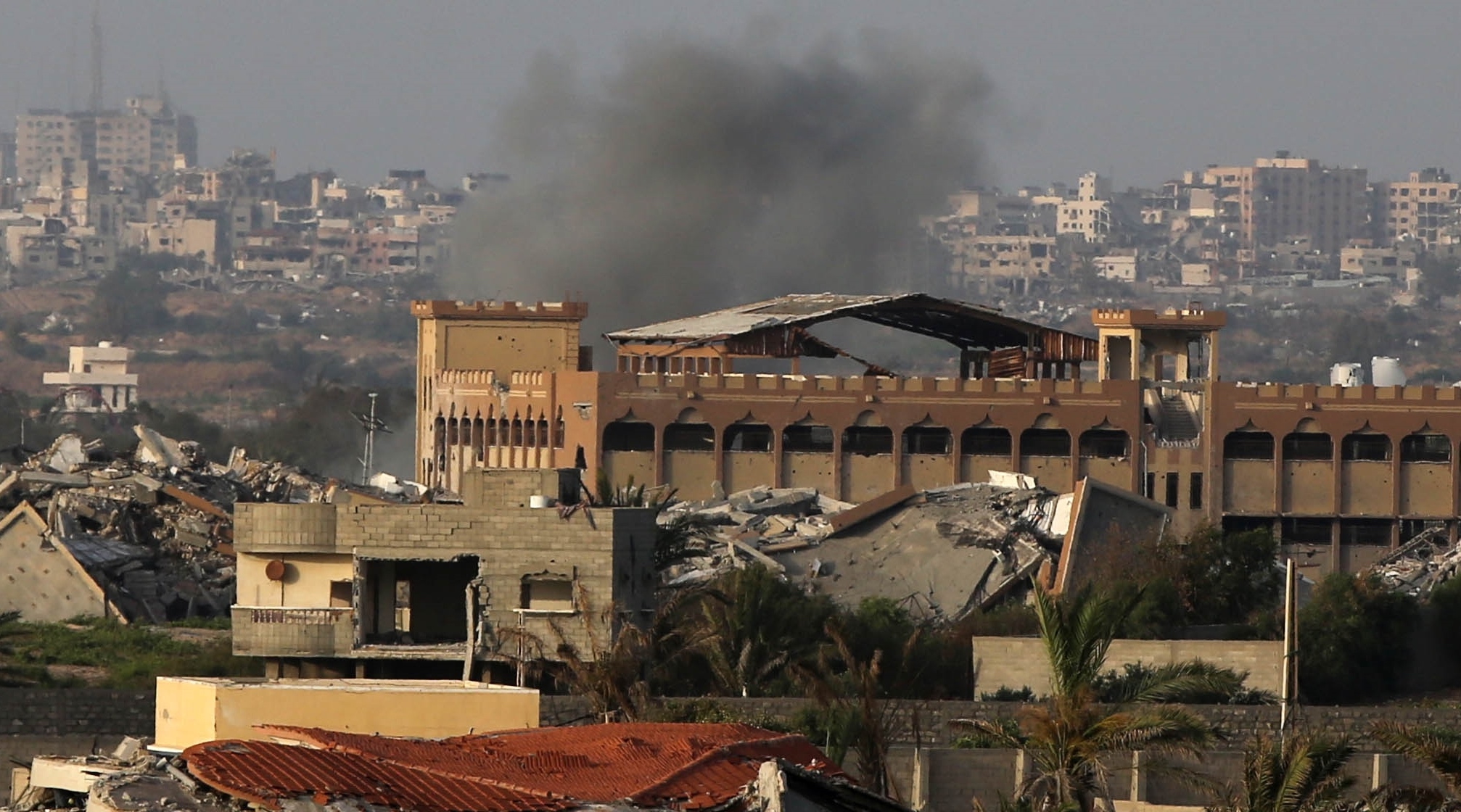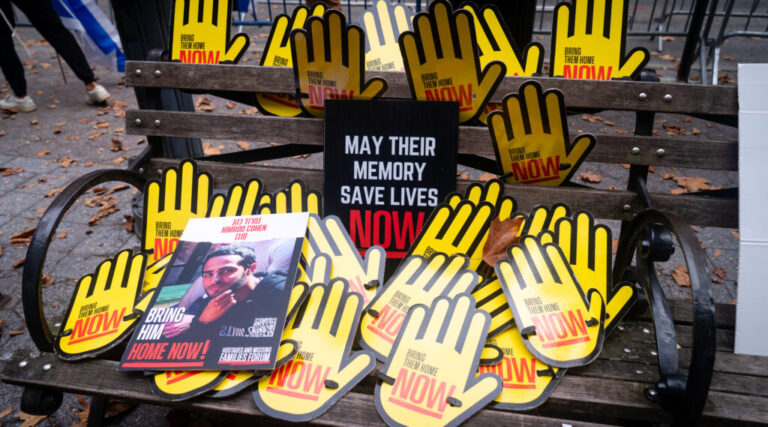WASHINGTON — When Donald Trump vowed that there would be “all hell to pay in the Middle East” if hostages are not freed by the time he takes office, what did he mean?
The president-elect’s statement, coming after the revelation that American-Israeli Omer Neutra was killed on Oct. 7, 2023, was long on fury and short on details.
“Everybody is talking about the hostages who are being held so violently, inhumanely, and against the will of the entire World, in the Middle East — But it’s all talk, and no action!” Trump said in his statement posted on Truth Social, the social media platform he owns.
“Please let this TRUTH serve to represent that if the hostages are not released prior to January 20, 2025, the date that I proudly assume Office as President of the United States, there will be ALL HELL TO PAY in the Middle East, and for those in charge who perpetrated these atrocities against Humanity,” he said. “Those responsible will be hit harder than anybody has been hit in the long and storied History of the United States of America. RELEASE THE HOSTAGES NOW!”
Trump’s statement could just be bluster, said observers, or it could be a sign of real intentions: to target a regional military figure, or sanction countries that harbor Hamas officials, or create the conditions for Israel’s far-right politicians to accept a ceasefire deal. The president-elect could also be positioning himself to claim credit if a ceasefire is reached before his inauguration, some suggested. The unlikeliest scenario is that he would put American soldiers’ lives at risk in the battle against Hamas.
The immediate assumption among Israelis and American Jews who are in Trump’s orbit is that he was referring to the 101 hostages still held by Hamas in the Gaza Strip, though Trump did not specify further and a spokesman did not respond to a request for clarification.
“I want to thank President Trump for his strong statement yesterday about the need for Hamas to release the hostages, the responsibility of Hamas, and this adds another force to our continued effort to release all the hostages,” Israeli Prime Minister Benjamin Netanyahu said in a statement.
But if Trump is referring to the Hamas-held hostages, what means could he use to pressure Hamas that haven’t already been exercised?
And most saliently, does his threat to hit the perpetrators “harder than anybody has been hit in the long and storied History of the United States of America” mean that the United States will attack Hamas directly?
According to analysts across the political spectrum, the answer to that second question is no.
“The concept of Americans coming back in body bags serving in the Middle East is not popular with Americans, not just with Trump,” said Shira Efron, the senior director of policy research at the Israel Policy Forum.
In the end, Efron said, Trump has a penchant for inflammatory rhetoric — and an aversion to war: In 2017, he threatened “fire and fury like the world has never seen” on North Korea for testing a nuclear warhead-carrying missile. Before long, they were meeting in Singapore.
“I just feel like these statements, I don’t know what he’s going to be — he could be much more experienced than last time and not make statements in vain, but I don’t know,” she said. “We have precedents to show that there are statements that are followed by different steps.”
What would those steps be? Israel, with American funding and weapons, has already been relentless in its pursuit of Hamas, killing much of its leadership, driving the rest into retreat and destroying much of the Gaza Strip’s infrastructure.

Israel, with American funding and weapons, has already been relentless in its pursuit of Hamas. Above, smoke rises after Israeli attacks on the northern Gaza Strip, May 21, 2024. (Ashraf Amra/Anadolu via Getty Images)
Trump ordered the assassination of Qasem Soleimani, an Iranian commander, in 2020. But this time, it’s not exactly clear which individuals he could target. Hamas has not named a leader since Israeli troops felled the architect of Oct. 7, Yahya Sinwar, in September.
The “hell” that Trump is threatening could be more applicable to Hamas’ enablers in the region, said Jonathan Schanzer, the vice president of the Foundation for Defense of Democracies, a think tank that favors a more confrontational posture toward Israel’s enemies than the Biden administration has demonstrated. He suggested that Trump’s threats referred to non-military tactics.
“Saying ‘all hell’ may have been an exaggeration, but we have not imposed sanctions on the Turks believed to be harboring and financing Hamas,” Schanzer said in an interview. “We have not put full pressure on Qatar,” whose humanitarian aid bankrolled the Hamas regime, until recently. Qatar last month pledged to eject Hamas leaders from its territory, though it is not yet clear if that has happened.
Schanzer recommended threats to draw down major U.S. military presences in both countries. “The Turks have been supporting Hamas, and yet we maintain very sensitive weapons and personnel in Incirlik,” he said, referring to the U.S. airbase in Turkey, which is a member of the NATO transatlantic alliance.
EJ Kimball, an expert on counterterrorism at the U.S.-Israel Education Association, also called for pressure on Hamas’ enablers, although he acknowledged that it could be complicated by the complex relations the United States has with some of the countries, particularly Turkey.
“Turkey is a much bigger challenge, especially the NATO factor,” he said.
The Turkish leadership needs to understand the crucial role they must play in the current situation. One key message is that countries like Turkey and Qatar should not only expel and cut off funds to Hamas officials but also extradite them to the United States. This recommendation is part of a set of suggestions put together by Richard Goldberg, a senior adviser to FDD. Another suggestion is for countries, including Turkey and Qatar, to be aware that the United States will support Israeli efforts to eliminate Hamas officials wherever they are located.
The Biden administration has been cautious in its approach, unlike the Trump administration, which is more assertive in its stance towards countries housing Hamas leadership. However, it remains uncertain whether pressuring these countries will lead to a change in Hamas’ behavior and the release of hostages.
There are speculations that Trump’s aggressive statements could be a strategic move to push Hamas towards a deal, possibly in collaboration with the Biden administration. This coordinated effort may indicate a shift in foreign policy cooperation between the two administrations.
Positive signals of a potential deal are emerging, including Hamas’ isolation after Hezbollah agreed to a ceasefire with Israel. Trump’s statement may be aimed at taking credit for any progress towards a hostage deal or pressuring far-right elements in Netanyahu’s cabinet.
Overall, there is hope that Trump’s rhetorical shift will contribute to advancing negotiations and ultimately reaching a resolution in the region. The conversation surrounding Hamas and Israeli-Palestinian conflict needs to evolve, and Trump’s involvement could be a catalyst for change. To regenerate means to restore, renew, or revive something back to its original state or function. This could refer to physical regeneration, such as the regrowth of cells or tissues in the body, or it could also refer to the renewal or revitalization of something like a community, ecosystem, or organization.
Source link

